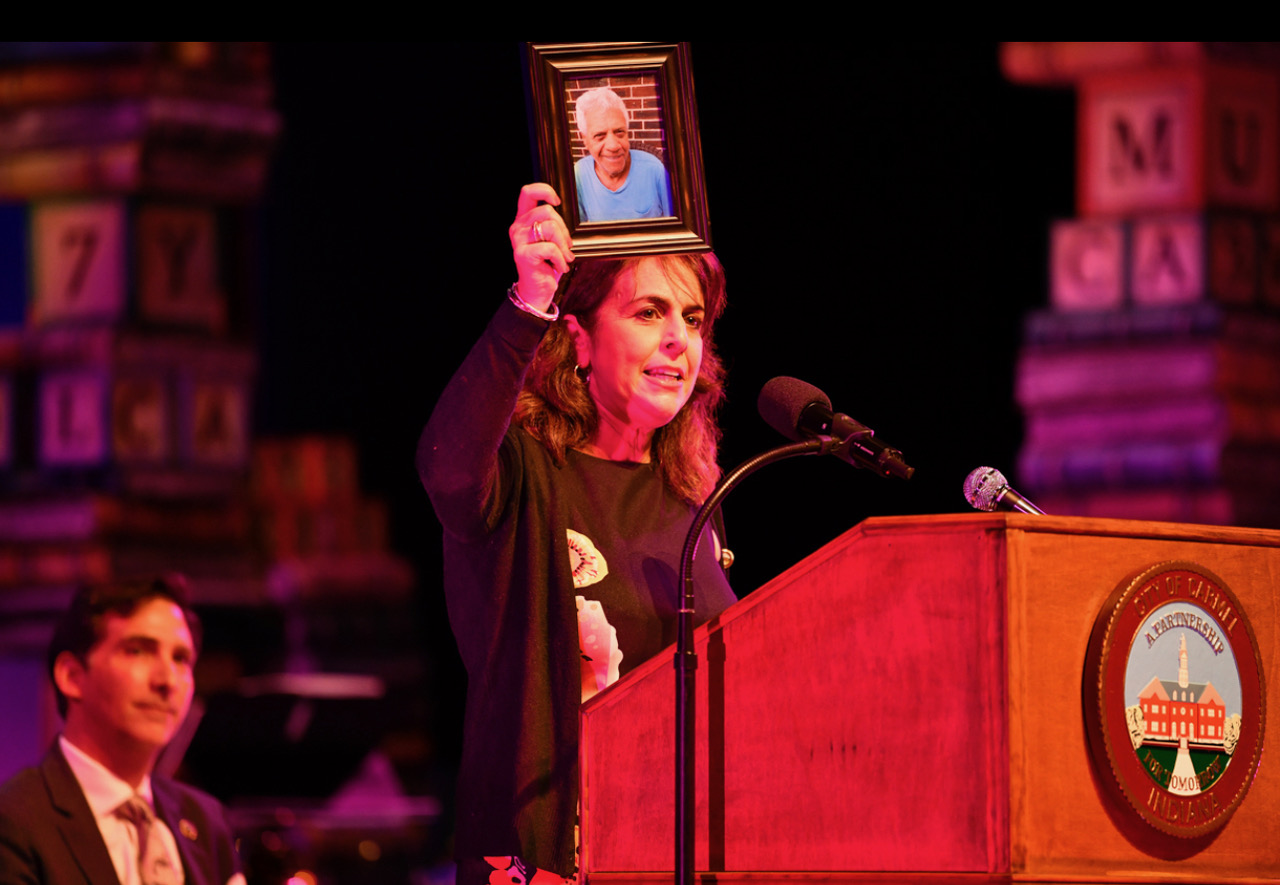When Laurie Freeman invited her 95-year-old father, Jack Bronicki, to hear her speak at the Carmel Holocaust Remembrance ceremony, he quickly declined.
“(He said) ‘I don’t need to come, I already lived through it,’” she said. “‘I know the story. I’m trying to forget.’”
Freeman shared her father’s story April 29 at the ceremony at The Tarkington at the Center for the Performing Arts in Carmel.
Jack grew up in a poor family in a village in Poland, which is now part of Belarus. His father, Fivel, was a carpenter, and his mother, Golda, mended clothes to make money. Jack was the youngest of four boys. The oldest was Shepherd, who had polio, followed by Meyer and Lipa. In 1939, Germany’s Adolf Hitler and Russia’s Joseph Stalin agreed to divide Poland.
“My dad’s town was on the Russian side,” said Freeman, a marriage and family therapist who lives in northern Indianapolis. “Communism improved his life because getting food wasn’t as difficult.”
A year and a half later, Germany broke the pact and invaded Russia and her father’s town.
“When the Gestapo came, the Jews were separated from non-Jews, forced to abandon their homes and possessions and moved to the ghetto,” Freeman said. “They built a hole under the rug in the newly assigned home. They could hide food there and (it became) a place where Shepherd, who couldn’t walk, could hide. It also turned out to be Shepherd’s grave.”
Freeman said the Gestapo ordered all carpenters to report, and the family later learned Fivel and others were shot and buried in a mass grave.
“One day my father saw the Gestapo surrounding the ghetto from a distance while at work and asked to go to the bathroom,” said Freeman of her father, who was 13 or 14 at the time. “In a split-second decision that saved his life, he ran to the woods to escape. He hid there all day listening to gunfire, waiting to return to his family. He ran into a non-Jew from his town who told him to turn back into the woods because they were killing everyone.”
Freeman said her father found a home with others for one night, but when he woke up, he was alone.
“He relied on begging for food from nearby villagers,” Freeman said.
Jack later found another abandoned home to stay in during the winter. When spring came, the shooting began again, and he took off for the woods. He met some young people who taught him how to dodge bullets.
“The natural inclination is to panic and run straight ahead,” Freeman said. “He learned not to do that. Instead, he was told to run a little ahead and stay low because the Germans will shoot far in the distance to clear people out. Once while hiding in the leaves, a German soldier passed so close he could touch his boots. My dad said his heart was beating so fast he felt the soldier could hear. Fortunately, the soldier didn’t look down or my dad would be dead.”
While stopping at a house to ask for food, a family fed him barley soup with meat. When a soldier came to the door to ask if anyone was there who didn’t live there, they pointed out her dad.
“They were willing to feed a starving young boy, but not willing to give up their own lives for him,” Freeman said. “The soldier held a gun to his head. My dad said at that point he didn’t care if he lived or died, he just wanted to eat.”
The soldier, who turned out to be a Russian partisan, waited until he was done eating and took him outside. The soldier told him which towns to visit to get to the Bielski brothers’ camp.
“The Bielski brothers led one of the most significant Jewish resistance efforts during the war,” Freeman said. “Their goal was to fight the Germans but also provide a safe haven for Jews in the forest, primarily women and children. Under their protection, over 1,200 Jews survived the war.”
Jack found his mother and Meyer at the camp. After being liberated by Russia’s Red Army in 1944, Jack, Meyer and their mother returned home, but their house was gone. They lived in an abandoned home for two years before they were placed in an American camp for displaced people. By that time, Lipa had returned from fighting in Russia. Jack finally was able to come to America in 1951. He learned English and later became a self-trained plumber in Indianapolis. However, he suffered from post-traumatic stress disorder.
“The war was over, but the trauma of abandonment, hunger and persecution continued to shape his view of the world,” Freeman said.
Freeman said she tells the story to honor her father and memory of his family members who didn’t survive.
“I tell it as a testimony to those that deny the Holocaust happened,” Freeman said. “I tell it as an example of when religious and other types of discrimination become out of control.”



